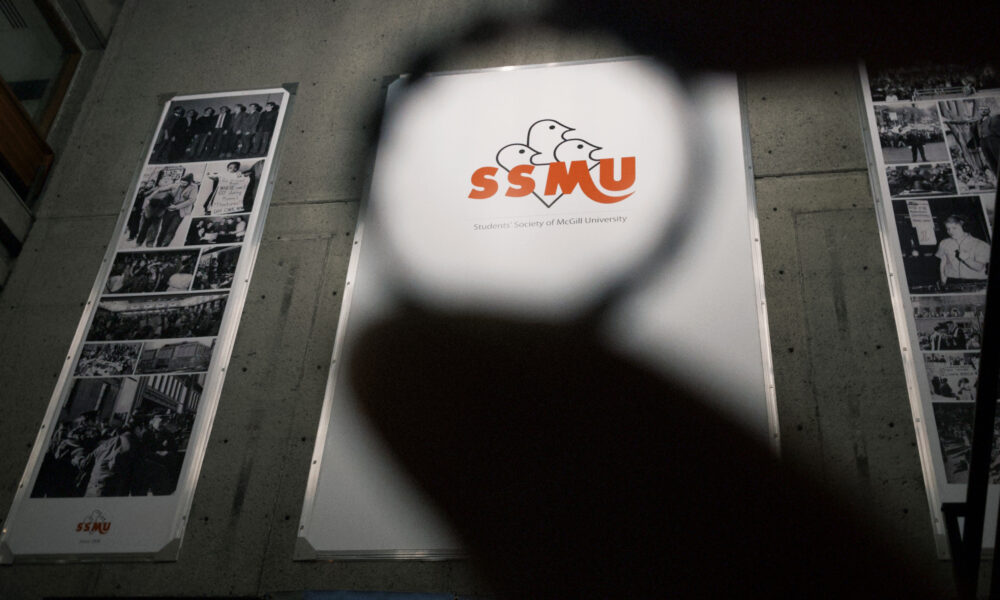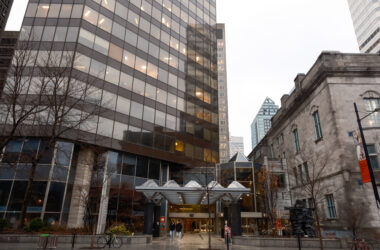Polls to decide next year’s Students’ Society of McGill University (SSMU) executive team and the results of the 19 Winter 2024 Referendum questions closed on March 22. Of the 22,504 eligible voters, 19.1 per cent cast a ballot in the election for the executive board, and 19.2 per cent voted on the referendum questions, in comparison to the 35.1 per cent of students who cast a ballot last semester. All but three referendum questions passed.
The question of an SSMU Base Fee increase failed with 58.3 per cent of voters casting a “No” vote. The increase would have mandated that full-time students in all faculties excluding Law, Dentistry, and Medicine pay an additional $27.11 per semester for a total of $95.59, and part-time students in all faculties excluding Law, Dentistry, and Medicine to pay an additional $13.16 per semester for a total of $46.40 per semester. SSMU had heavily advertised for a “Yes” vote to this question in the weeks preceding the election, as the fee increase also failed to pass last semester. SSMU argued that an increase to the membership fee was necessary to continue to provide 18 services, over 200 clubs, continue to operate Gerts, and pay SSMUnion employees liveable wages, as SSMU it has been operating at an anticipated annual deficit of $726,257.90.
In a written statement to The Tribune, the SSMU executive team expressed that they were disheartened by the result of the vote, and will have to reduce their operations significantly.
“[M]aintaining such a large deficit is not sustainable. We have already done what we can to reduce our deficit without reducing student benefits, and we have reached the limits of those cuts,” they wrote. “We will be working closely with the SSMUnion over the next few weeks to discuss next steps, as they are a key collaborator and supporter of the base fee increase. We intend to reassess the base fee campaign and to better understand the students’ needs in anticipation of running at least one more referendum to increase SSMUnion employee salaries.”
Alongside the referendum questions, the 2024-2025 SSMU executive board was also voted in—excluding the positions of President and Vice-President (VP) Finance—as no candidates came forward for these two positions during the nomination period.
Chloé Muñoz was elected VP Student Life, with 50.2 per cent of the vote. Avin Ahmadi, who also ran for the VP Student Life position, received 32.4 per cent of the vote. Muñoz expressed that she feels pleased that her hard work campaigning paid off, and that she looks forward to spending the summer revamping and standardizing processes for SSMU clubs.
“Through this process [of campaigning] I was also able to learn more about community concerns directly,” Muñoz wrote to The Tribune. “This one-on-one discussion is something I hope to carry through in my position.”
In a written statement to The Tribune, Ahmadi wished Muñoz well for the upcoming year and explained that she would not be running for the remaining two executive positions, as she felt her experience was more relevant and aligned with the VP Student Life role.
“In my opinion, the main purpose of elections is for students to choose who they want to have on the executive team, and ultimately the executive staff are there to represent students. I respect the results and wish Chloé all the best,” Ahmadi wrote.
VP-elect Sustainability and Operations Meg Baltes, who ran unopposed, was elected with 80.3 per cent of the vote. Baltes expressed her excitement to begin the role in a written statement to The Tribune, thanking all the students who voted for her. Baltes explained that her first steps in the position would include working to understand the actions of past executives.
“I believe using my training period to fully flesh out the position will ensure that I can be successful throughout the school year,” Baltes wrote. “While I do not want to go into the role with a preconceived agenda, I do believe that it is important to make spaces for student organizations and clubs in the building (especially ones that offer essential services to students to tackle issues such as mental health and food insecurity), revitalize Gerts to make it a community hub, and make sure mini-courses are accessible to a larger amount of the student body through increased subsidies.”
Baltes also addressed concerns surrounding her candidacy, including the fact that she is a full-time honours student, which could potentially limit the hours she is able to dedicate to the position.
“[M]y busy schedule may serve as a benefit to the position. I am a big proponent of efficiency and usually hate bureaucracy because of its incredible time lag in enacting tangible policies. Therefore, I am coming into this position with no intention of wasting my time. I want to go into the school year with a clear vision, effectively delegate responsibilities, and not entertain meetings or discussions that are arbitrary,” Baltes wrote.
For the VP External position, Hugo Solomon received a 52.1 per cent vote, while Michal Ekiert* received a 29.1 per cent vote—the other 18.8 per cent of voters chose neither of the candidates. Solomon expressed that he felt elated to win the election in a written statement to The Tribune.
“It might sound cliché but it’s an immense privilege to represent the SSMU members and student body in such a consequential, powerful moment. I’m excited, sure, but also candid about the multifaceted challenges that me and the board will undoubtedly face in making our vital objectives manifest. I welcome the coming challenge, and I celebrate the journey which has led me to this moment,” Solomon wrote.
Solomon also acknowledged that many students continue to grieve the ongoing genocide in Palestine and promised to work alongside Palestinian advocacy groups on campus.
“I see your frustration. I see the undeniable determination and resolve of the hunger strikers putting their very lives on the line. So let me be clear: I pledge to work with you to achieve justice, working across communities and student groups to make our campus safer and reflective of our values,” he wrote.
Zeena Zahidah*, who ran unopposed, won the VP Internal Affairs position with a 79.3 per cent vote.
Abe Berglas won the VP University Affairs position after running unopposed with a 75.4 per cent vote. Berglas declined to provide a comment to The Tribune.
A by-election will likely be held to fill the President and VP Finance positions. The nomination period for the presidency began on March 25.
“We are hopeful that a candidate will step forward in the by-election and have even received a few people interested in the role before the by-election was announced. In the scenario that no candidates present themselves, the tasks of the president will likely have to be distributed among the executives,” SSMU President Alexandre Ashkir said in a written statement to The Tribune. “Work has been done this year to increase transparency and accountability by the membership, which we hope will invite further involvement of members in their union.”
Along with the question of the SSMU Base Fee increase, two other questions failed on the referendum. The question of an increase to the Referral Services fee—which currently supports the Union for Gender Empowerment (UGE), Queer McGill, the Peer Support Centre, the Eating Disorder Resource Centre, and Nightline—failed with a 54.6 per cent “No” vote.
UGE explained that the majority “No” vote means that UGE will not receive its allocated $1.25 of the Referral Services fee increase, and subsequently will have to run its services at a reduced capacity.
“To be specific, this means that our resource co-op, which offers pay-what-you-can gender-affirming gear, reusable menstrual products, and safer sex supplies, will not be as well stocked next year,” a representative of the UGE who wished to remain anonymous told The Tribune. “We will not be able to hire a full team of staff, or run as many events. Unfortunately, we foresee that the UGE will simply not be able to serve as many students as we would like.”
In addition, the question of the First-Year Fee reinstatement failed with a 51.9 per cent “No” vote. The fee, which supports the First Year Council in organizing events and giveaways for first-year students at McGill, also failed to pass in the Fall 2023 Referendum.
A student-initiated question concerning the renewal of the opt-outable fee toward Student Support—a for-profit company that provides students with services such as Calm, ProWritingAid, and Udemy—also passed. While the SSMU Legislative Council voted to terminate its relationship with the company on Feb. 9, 2023 due to the company’s history as FundQi and ethics, the question received a 57.6 per cent “Yes” vote.
SSMU WALKSAFE passed its fee increase, with a 65.9 per cent “Yes” vote. The service provides students with a safe means of travelling throughout Montreal, with a team of two volunteers to accompany them on their walk home or on public transportation.
The student-initiated question for an opt-outable fee increase for MustBus—a student-run bus service that has routes to cities like New York, Toronto, and Boston—passed with a 51.1 per cent “Yes” vote. Keep.meSAFE—a service that provides free and confidential mental health for students—also successfully renewed its fee with a 64.4 per cent “Yes” vote.
The Black Students’ Network (BSN) service fee increase passed with a 61.2 per cent “Yes” vote. The opt-outable fee increase will aid BSN in implementing the Addressing Anti-Black Racism Plan and continue to offer events throughout Montreal. The Arab Students’ Network fee increase also passed with a 56.1 per cent “Yes” vote.
Two questions regarding the funding of the Legal Information Clinic passed. The first was to renew the clinic’s fee, which passed with a 72 per cent “Yes” vote. The second was to increase the fee from $4.50 to $5.71, which passed with a 59.4 per cent “Yes” vote. Similarly, the Campus Life fee was renewed with a 60 per cent “Yes” vote and secured a fee increase (from $2.00 to $2.83 per semester) with a 50.2 per cent “Yes” vote.
Other questions that passed included the Queer Equity Support Fee increase, Club Fee increase, the Student Academic Support Services fee increase, the Library Improvement Fund fee renewal, and the Creation of Student Rights Fee and Fund.
*Ekiert and Zahidah could not be reached for comment in time for publication.
This piece was updated at 6:22 on March 26.









